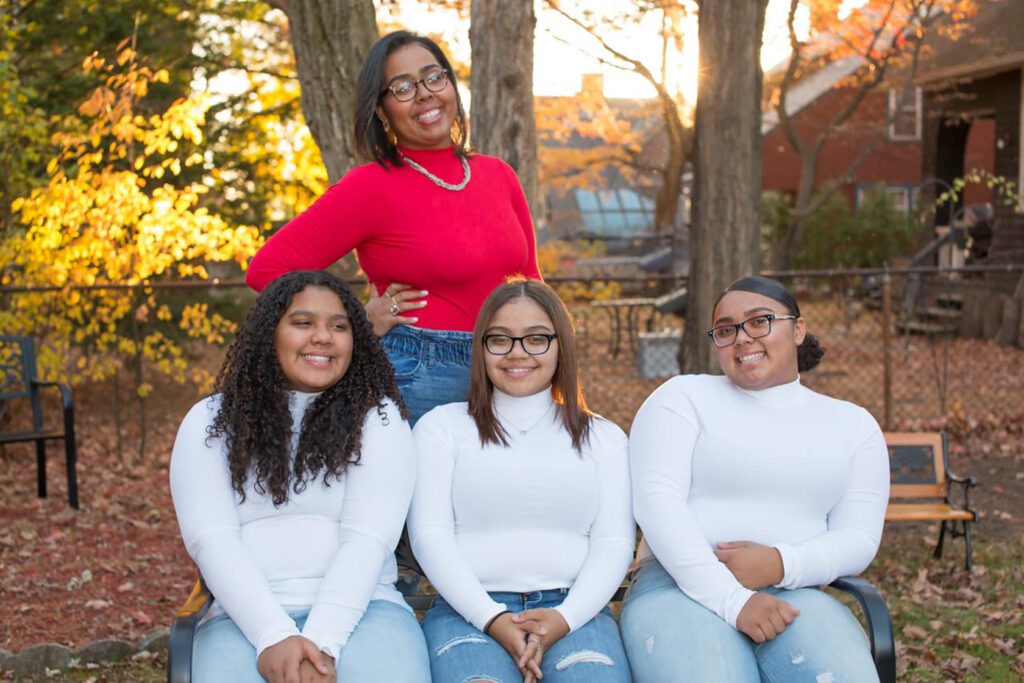
Carolyn Martinez was in a predicament.
In 2012, the Springfield native was a 25-year-old single mom to three daughters getting by on public aid. She relied on food stamps, disability assistance and cash assistance to make do. Determined to secure a better life for herself and her daughters, she began working another job.
That additional income, $800 every two weeks, triggered a sharp decline in her benefits.
Her $800 in monthly food stamps dropped to $300 within a year and then again to $40 until she was receiving nothing at all, except health insurance.
“It feels like a rug being pulled out from under you, and feeling like you no longer have support,” said Martinez, now 37.
She immediately regretted her decision to take on another position. Internally, she wrestled with staying at home and living off of benefits, which seemed like the easier option, or continuing to fight for her future with no financial shield.
Many others like Martinez find themselves in this place, stuck between barely getting by with public assistance or daring to earn more income and risk losing financial stability. This is called the “cliff effect,” or the benefits cliff, named so because of the sudden, unexpected and steep drop in benefits.
“It’s still fearful to know that at any moment, you can lose everything because you don’t have the right support,” Martinez said. “And the government doesn’t do a good job supporting the community in the sense of creating a bridge from being independent of the government to now trying to work.”
Enter the “Bridge to Prosperity” program, a pilot initiative led by nonprofit Springfield WORKS that aims to cushion the transition from public benefits.
About one in six Bay Staters receive some form of support from the Department of Transitional Assistance. Today, a four-person household, like Martinez’s, earning no more than $5,200 a month, can receive up to $973 in nutrition assistance. Bringing in more than the maximum income puts them at risk of losing their benefits.
“It’s a widespread issue that often goes unnoticed,” said Hannah Reuter, director of “Bridge to Prosperity.” “The thing that families are seeking is to thrive, right? And I think we live in a world where it takes financial resources for a family to thrive and be able to access the things that they need and want to live an enriching life,” she added.
Springfield WORKS, an initiative with the Western Mass Economic Development Council, was created in 2016 to mitigate underemployment and unemployment crises.
Before Springfield WORKS launched, the Western Mass Economic Development Council heard from employers who said the benefits cliff prevented them from hiring the employees they needed to keep their businesses afloat. The Springfield WORKS team began working on a program to assist families facing the cliff.
Legislatively authorized in 2022, the “Bridge to Prosperity” pilot has received approximately $1.8 million in funding, Reuter said, $1 million of which came from federal COVID relief money. The program will provide $500 in monthly cash assistance to a total of 100 families in Springfield, Worcester and Boston over two years, and the families can use the money as they see fit.
Participants of the program are also eligible to receive a $10,000 savings bonus as a launching pad into stability, and will also receive mentorship and coaching support as they work towards their career goals.
“We’re working to really think about the safety net as a holistic support system, rather than just one program here, one program there,” Reuter said. “I think that’s what’s made the “cliff effect” possible.”
“Bridge to Prosperity” plans to begin enrolling families into the program in September or October, Reuter said, starting with an initial cohort of 15.
Martinez said “Bridge to Prosperity” is a “great start to a huge problem” because of its solutions-oriented approach. She sees its potential impact.
After losing her benefits back in 2012, Martinez felt hopeless. She moved into Christina’s House, a transitional, educational home in Springfield for women and children experiencing homelessness or near homelessness, where she stayed for 18 months. The staff taught her how to budget and gave her the tools necessary to “stay focused and not be homeless ever again.”
After fighting off one of her worst anxiety attacks, she graduated from the program and later became its executive director, a role she’s been in for nearly two years now.
She’s in a better financial situation than she was 12 years ago, but she still feels the spillover of the “cliff” effect.
“Although financially, I’ve worked my butt off to get to where I’m at in my career … not having a transition to kind of help me from point A to point B, giving me the proper tools, put me in debt that to this day I’m still trying to get out of,” she said.
Martinez also witnesses the effects of the benefits cliff on the women she works with at Christina’s House — women who lose their benefits after moving into transitional housing because they’re no longer paying rent and lose support for seeking help out of homelessness.
For a long time, Martinez wanted to be a police officer. She still holds onto that dream, but for now, she’s focused on making a difference in her community. In May, she went before state legislators, sharing the story of how losing her benefits with no buffer affected her.
“If I struggle through it, doesn’t mean that the next person has to,” she said.
Martinez’s daughters are all in their late teens now, and she is furthering her education, working towards a degree in social work at Cambridge College.
“My ambition is to support people around me that feel like they don’t have a voice, that feel like they’re not important,” she said. “I strive to encourage people every single day to fight for themselves when they feel like no one is fighting with them.”






